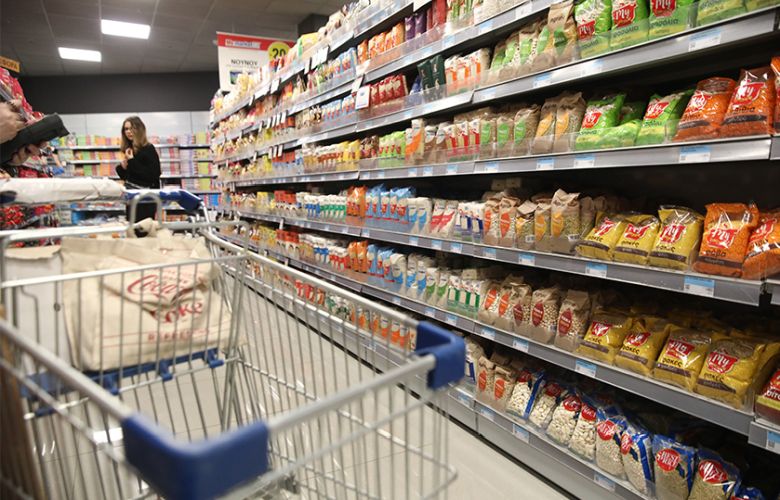Increasing prices brings more profits for companies and must get a brake on
In front of new data, regarding promotions and offers applicable to basic goods on their shelves supermarket, Consumers are located as the implementation of the new Code of Conduct and strict controls began to finally eliminate misleading practices. Already in large supermarket stores, new signs have been placed on the products in accordance with the Code of Conduct that details the price before and after the discount, in order to make it all clearer to the consumer.
According to the General Manager of the Hellenic Supermarket Union, Apostolos Petalas, with the exception of some bids that were already agreed before that they can be kept on the shelves until stocks are 100%, the rules of the new Code of Code are in force. As he explains, as there are bids on rapid products that have already been agreed in the past months with marking on packaging whose sale has not been exhausted, it was agreed to give a “grace” period by May 31. Thus, the Ministry of Development will control the shelves and new bids in the context of implementing the rules of the new Code of Conduct and tolerate until May 31 the old offers on rapid products (except for sunscreen and anti -mosquitoes given by the end of August) until their exhaustion.
According to Mr. Petalas, the Code of Conduct is about price communication, does not concern product pricing. It essentially has two basic principles. When a price reduction is communicated either in the form of a discount or in the form of supply, then the communication will be in relation to the reference price which is the lowest price sold this product for the last 30 days in that store. The second key element is that a quantitative offer (one plus one gift, two plus one gift, three plus one gift) cannot be valid all year long because then it is not the right price of the product.
Obviously, he notes, its price must be different from the one referred to in communication, and that is why it is determined by the Ministry of Development that the time of an offer may not apply more than 1/3 of the year. “The application of the code helps the consumer to be able to understand what exactly the communication that is done means. The consumer understands that communication (discount or bid) is done with a reference value and so everything becomes clearer, ”says Mr Patalas.
They are intensifying checks
At the same time, audit mechanisms are boosting their presence in the market for the implementation of the Code of Conduct on Offers, Discounts, and Promotions. As the Minister of Development Takis Theodorikakos has noted in his statements, the checks will not only be information and recommendations, but will lead to strict fines. “We want there to be bids and discounts but to be real and not be a mockery,” the minister said.
At the same time, he noted: “We have reinforced the TIMA with 30 new executives, we have increased the fines, we have imposed fines on multinationals, we call on citizens to use the e-Katanalotis platform, we are reinforcing the independent authority of the Competition Committee, with the result that the fate is about 4 months.”
Focusing on the checks and fines, Mr Petalas notes speaking to RES-EIA that “the fines are high. As the Code of Conduct in other retail markets has been implemented for two years, we have seen high fines imposed “and adds:” The ministry and audit authorities must see the intention of a business before imposing a fine. If a business really tries to apply the rules and makes a mistake it is best to make it a recommendation to correct it. But if he is not interested in applying the rules he must be punished. In this context, we have requested that the intention of a chain be judged in order to make the control being fair. “
It is recalled that a fine of EUR 5,000 to EUR 1,500,000 is imposed, and in the event of a five -year recurrence of up to EUR 3,000,000. Also, for serious infringements that carry a fine of more than 50,000 euros, the name of the business, as well as summary data on the infringement, are published by the Ministry of Development.
The new Code of Conduct in which commercial discounts and bids that are considered misleading – and should be avoided by the market – provides that, in a price reduction announcement (eg deduction or bid), the original price from which the discount is considered is the lowest price of the last 30 days.
Merchants can no longer be regarded as a “original price”, from which a discount, a very old “inflated price”, a “price list price” or a “suggested retail price”. On the contrary, the “initial price” to which they are mentioned should be recent, be the usual price at which the product is sold and be the lowest to which the product was offered in the last 30 days.
The Code of Conduct excludes vulnerable products, especially those of less than 30 days. However, violations related to discounts and bids on these products are punished by the general provisions on unfair commercial practices.
The driver focuses on basic directions by providing examples of good practices in order to highlight legal and legitimate behaviors and to draw attention to illegal and misleading practices and behaviors, taking into account the experience of the relevant legislation so far.
Increase turnover in January
The organized retail of the “rapidly moving consumer goods” (FMCGF) in the whole of the territory continues to grow this year. Specifically, the FMCG market recorded 8.7% in January 2025 in the supermarket, according to Circana Research Society data. Standard products rose 7.6% and 12.3% in bulk products. The total turnover amounted to EUR 966 million from € 889 million in 2024. In terms of large (GIGA) products, the largest sales value were raised in January (10%), however, both homes and personal care products and personal care products were increased. The price per unit was increased by 2.3%. An average price increases were recorded per Giga category, while reductions were recorded in both personal care and hygiene products (-2.9%) and home products (-0.9%). The highest price increases per unit were recorded in alcoholic beverages (10.9%), snacks (6.8%) and non -alcoholic beverages (3.1%). The largest reductions were recorded in personal care and beauty products (-3%), hygiene (-2.9%) and cooking products (-2.4%). The share of the private label (private label products) stood at 26.5% of total turnover with its growth reaching 5.3% of branded products. In foods, PL share is 26.6%, health and beauty products at 21.4 & and home products category at 27.6%. In terms of promotional activity, 23.7% of January sales came from products to a discount regime, recording a 1.5 percentage point. At the level of geographical regions, the largest increase in sales value was recorded in the islands (10.4%) followed by the Peloponnese (10.3%) and Crete (10.2%).
It is recalled that in 2024 the turnover of the FMCG organized retail throughout the territory, including the islands, reached EUR 14.8 billion, with growth of 3.6% compared to 2023. This growth came exclusively from sales volume, ie consumption. Correspondingly, the turnover of domestic online supermarkets, according to Convert Group data, amounted to € 335 million, up 9 and compared to 2023, when it reached € 306 million. The average value of online orders to 85 euros was also upward, increased by 6% compared to the average of 2023, which is mainly attributed to the increase in pieces per order.








